
by ThinkSayBe | Mar 28, 2014 | 2014, Africa, Communication, Cultural Differences, Culture, Economy, International, Language, Life Lesson, Poverty, Travel, Vacationing, World Motherhood
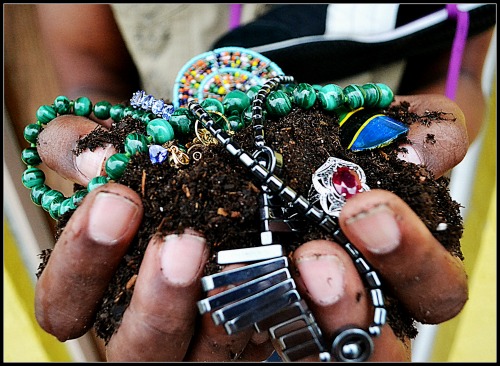 “Hey bro, vipi? How much for these shoes?” I ask the second-hand market vendor.
“Hey bro, vipi? How much for these shoes?” I ask the second-hand market vendor.
“Ah! Those, for you, those are $30 U.S.dollars,” he responds with a tone indicating that he’s giving me a deal. He didn’t know I was Tanzanian, maybe because I hadn’t yet spoken more than a few words in Kiswahili. Words that any foreigner who cared to find out would have known.
“$30?! I can get a new pair of shoes in the U.S. for that amount!” I say in return, flabbergasted by the price this man just gave me.
After a few minutes of haggling, going back and forth about the quality of the shoes, and his realization of my nationality, we do not close the sale of these shoes, but commence having a very important conversation about the poverty of Africa.
I will call this man Peter, as I do not recall his name.
As I talked down the price of the shoes, Peter said things like, “You people have money!” and “Come on, you can pay this amount easily.”
When Peter and I started talking (immediately after I decided not to purchase the shoes), I asked him his reasons behind hiking prices up so high for foreigners. He simply said, “Because we are poor here in Tanzania, and in Africa, so I have to try to earn money some way, and you guests have the money.” (more…)
I am a mom amongst some other titles life has fortunately given me. I love photography & the reward of someone being really happy about a photo I took of her/him. I work, I study, I try to pay attention to life. I like writing. I don't understand many things...especially why humans treat each other & other living & inanimate things so vilely sometimes. I like to be an idealist, but when most fails, I do my best to not be a pessimist: Life itself is entirely too beautiful, amazing & inspiring to forget that it is!
More Posts
Follow Me:


by Kyla P'an (Portugal) | Mar 24, 2014 | 2014, Awareness, Being Thankful, Childhood, Education, Eye on Culture, Family, Feminism, Inspirational, Language, Life Lesson, Parenting, Preschool, Relationships, USA, Womanhood, Women's Rights, World Mom Feature, World Moms Blog, World Motherhood, Younger Children
 From almost the moment our daughter came onto the scene eight years ago, we knew she had a strong personality. She was one of those incredibly alert and determined babies; the type you could tell was processing her surroundings and trying to figure out what to do about them.
From almost the moment our daughter came onto the scene eight years ago, we knew she had a strong personality. She was one of those incredibly alert and determined babies; the type you could tell was processing her surroundings and trying to figure out what to do about them.
While many babies and toddlers her age were delighted to be pushed in a swing, my daughter would have nothing to do with swings until she was old enough to figure out what made them go. She had no desire to be the passive recipient of being pushed, instead she wanted to be in control; she wanted to conquer it. She took the same approach with toys, puzzles and games. She was an early walker, a determined eater, and an all-around intense little thing.
My husband and I frequently got comments like: “boy, you’ve got your hands full with that one,” or “she’s going to keep you on your toes.”
As our daughter grew, by far her favorite activities involved sorting, organizing and problem solving. I have one vivid memory of her toddler music class, when she was just two years old. About three-quarters of the way through the class, the teacher put out a basket of instruments for the children to choose from and play along with. Our daughter, who was particularly fond of the little plastic eggs filled with beans—which she called shake-a’s—was determined to collect as many of them as possible. Driven by this singular motive, she went around the room delivering alternate instruments to fellow toddlers and parents alike. Anytime she encountered an individual who already had a shake-a, she’d attempt to persuade them with an alternate instrument in exchange until she had gathered a significant cache.
During these displays of self-assured behavior and go-get-‘em spirit, I often found myself shrinking into the background, hoping other parents wouldn’t fault me for having such a pushy, precocious child. At this particular music class, however, a parent approached me afterwards and commended me for having such a “strong child with clear leadership potential.” With her few words of encouragement, this parent liberated me from my deep mommy guilt about having a child with drive.
I was in constant conflict because, even though I am a child of the 70’s—a time when many of our mothers here in the US were breaking down stereotypes and entering the workforce en masse—I was raised by my father, who came from an old-world upbringing and had old-fashioned views of how boys and girls should behave.
I am reluctant to admit that, rather than celebrating my daughter’s inherent leadership qualities, I labeled her as “bossy” and occasionally even criticized her for being too demonstrative.
Bossy, a word inferring that someone is behaving “boss-like,” should be a compliment heralding someone’s leadership skills but ironically, instead it criticizes her for it. It’s a label reserved primarily for girls. You rarely hear it applied to boys. A little girl on the playground, organizing kids into teams and assigning them roles will quickly be knocked down a few rungs by calling her “bossy,” whereas a little boy taking the same actions might be respected and followed.
I’m ashamed to admit, even I supported this stereotype. I was concerned my daughter was too confident interacting with adults, leading activities and organizing groups. I was concerned she wasn’t “girly” enough, lacked empathy and a gentle, nurturing-side. As a modern, liberated and independent woman myself, I still didn’t want her peers to ostracize her or put her down.
Why was I struggling between nurturing and diminishing my daughter’s inner boss? Why was I uncomfortable with her being a leader, or overly-confident or intensely goal oriented? What could I do to help raise this new generation of girl-leaders?
Two weeks ago I got some reassuring answers. They were in the Wall Street Journal, on a full-page, front-of-section article titled, “Don’t Call Us Bossy.” And the women giving the encouragement were the Chief Operating Officer of Facebook, Sheryl Sandberg, and the Chief Executive Officer of Girl Scouts, USA, Anna Maria Chavez.
Sandberg and Chavez’s goal is to redirect our thinking about the way girls lead. To relabel our vocabulary about girls’ take-charge behavior. Instead of bossy behavior, recognize it as executive leadership potential, like CBS television anchor, Norah O’Donnell does. Instead of discouraging ambitious goals, support girls to recognize their inherent ability to achieve whatever goal they set out for.
I think the world would be a very different—and frankly far more pleasant—place to live in if there were more “bossy” women in charge.
Let’s take a stand to have more female bosses in the workplace; Here’s to raising our girls to be the leaders they are capable of being, not the followers our lexicon makes them feel they are supposed to be!
Did anyone ever call you “bossy” growing up? Do you see these qualities in your own child? How do you feel about assertive and confident girls?
For ways to encourage leadership in girls, visit LeanIn.org and BanBossy two of the movements supported by Sheryl Sandberg, Ana Maria Chavez and Girl Scouts, USA.
This is an original post to World Moms Blog from our managing editor and mother of two, Kyla P’an.
The image used in this post is credited to Pat Moore. It holds a Flickr Creative Commons attribution license.
Kyla was born in suburban Philadelphia but spent most of her time growing up in New England. She took her first big, solo-trip at age 14, when she traveled to visit a friend on a small Greek island. Since then, travels have included: three months on the European rails, three years studying and working in Japan, and nine months taking the slow route back from Japan to the US when she was done. In addition to her work as Managing Editor of World Moms Network, Kyla is a freelance writer, copy editor, recovering triathlete and occasional blogger. Until recently, she and her husband resided outside of Boston, Massachusetts, where they were raising two spunky kids, two frisky cats, a snail, a fish and a snake. They now live outside of Lisbon, Portugal with two spunky teens and three frisky cats. You can read more about Kyla’s outlook on the world and parenting on her personal blogs, Growing Muses And Muses Where We Go
More Posts - Website
Follow Me:


by Mannahattamamma (UAE) | Mar 19, 2014 | 2014, Computers, Cultural Differences, Culture, Education, Expat Life, Government, Homeschooling, Living Abroad, Multicultural, Older Children, Politics, Religion, School, Social Media, Traditions, UAE, USA
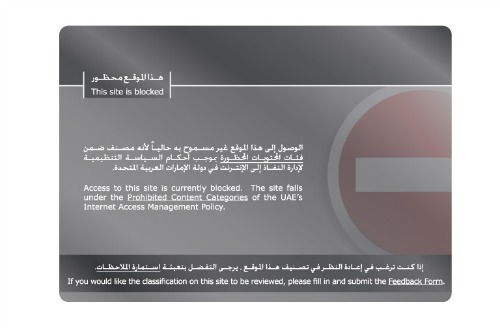 I always swore I would never home-school my children. I know many people do, and do it quite successfully, but I’m awfully fond of the quiet that descends on my house after they’ve tromped off to school. If that tromping were only happening from the bedroom to, say, the kitchen table, I think I might simply lock myself in the bathroom and never come out.
I always swore I would never home-school my children. I know many people do, and do it quite successfully, but I’m awfully fond of the quiet that descends on my house after they’ve tromped off to school. If that tromping were only happening from the bedroom to, say, the kitchen table, I think I might simply lock myself in the bathroom and never come out.
But as so often happens, my vow has collided with reality and I have found myself, in recent weeks, trolling home-schooling websites in search of teaching resources. My kids are now 9 (nine and a half, he would say indignantly) and 13; they go to a British school here in Abu Dhabi. That means they’ve spent a lot of time learning various English kings and queens, although they can’t recite them all in order. They study “maths,” and do prep rather than homework; they study English history and geography; they read mostly English writers in their literature classes. In addition to all those Anglo studies, they take Arabic language classes four days a week and once-weekly class called “Islamic Studies.” The Arabic classes are mandated by ADEC (Abu Dhabi Education Council) and I have to say, I’m much more interested in my kids learning Arabic than I am in their ability to name all the English kings and queens.
Having the boys be in an English system has been a learning curve for all of us. We’re learning two languages, actually, Arabic and, well, English: the boys now live in a world where things are “grey,” luggage goes in the “boot,” and we put garbage in the “bin.”
I’m not considering a dabble in the home-schooling system in order to beef up my boys’ appreciation of the Queen’s English, however. My kids, like every schoolchild in the country, have a curriculum that is at least in part determined by the UAE government, and that means there are things that aren’t supposed to be taught. I live in a place where censorship happens and where, unlike the States, the policies cannot be overtly challenged in the courts. So, for instance, in the States if you live in a town where they want to ban the Harry Potter books, you can take the school district to court. Not here.
We had to sign a permission slip so that our older son could get the science textbook that included the chapter on reproduction (with pictures of, you know, the embarrassing bits); his Latin class translates vinum as … grape, not wine. These are relatively small annoyances, although of course they are far from ideal.
There are, however, more serious concerns in terms of what shouldn’t be included in history courses and literature courses, and that’s where I find myself trolling the home-schooling sites for resources. The Holocaust can’t be taught here; Israel and Judaism are not supposed to be mentioned here; communism isn’t supposed to be discussed; evolution isn’t supposed to be taught; and the list goes on. Sometimes it feels as if we’re living in some kind of Bible-thumping town in the rural U.S and I realize, yet again, that fundamentalism can be seen as a global phenomenon that differs only in the nature of its prohibitions: the fear that motivates the prohibitions stays constant.
Before you leap to any conclusions, please know that the Muslim families I know are as frustrated by these government-issued edicts as are the non-Muslim families and many of us have talked together about what we can do to help our children gain a full picture of the world, regardless of what the government says. So it is that what in some contexts (living in Manhattan, for instance) would be a purely theoretical discussion has become in our household, a very pragmatic series of conversations.
Think about it: how would you talk to your kids about censorship? Is censorship always bad? Think about your children, if you have them, and the internet: are there sites you say they can’t see, or have you put a filter or something on your computer to prevent certain kinds of access? Do we agree that there is such a thing as “good” censorship? (Because of that whole teenage-boy-surfing-the-internet thing, I see a (slight) upside to living in a “nanny state.” I am fairly sure that if he wanted to look, my son wouldn’t be able to find basic porn–not to say that if he really wanted to dig around he couldn’t elude the censors, but at this point, I think his porn-directed vocabulary is still too limited to get around the government blocks. I guess we file that under “thank goodness for small favors,” right? )
My husband and I are both professors, and so we are able to bolster and supplement what isn’t happening in school, but we are also having a lot of conversations with our kids about censorship, politics, and the necessity of thinking about things in ways that are different from how we might think about them. We point out that the UAE isn’t Saudi Arabia; there is no Taliban here; the country is not governed by a theocracy of any sort. We know Jewish families who live here; I know gay couples who live here; a Mormon family lives next door to us. I see people on the beach in the scantiest of scanty bathing suits.
Living here means coming to term with nuance, with ambiguity, with living in a world that is organized around “both/and,” rather than “either/or.” The country is progressive and conservative; censorship is a problem that has a context; learning happens as much from what is not there as it does from what is there. It’s complicated and let’s be honest — no nine year old, no thirteen year old—and very few adults—really likes ambiguity. After all, if there is no “in-between” answer, life becomes much easier, doesn’t it?
No, of course I’m not happy that my kids have a biology textbook with the word “pig” marked out. Of course, I’m also not pleased that the Anglo-centric curriculum also neglects things like the US Civil War, other than in the most general sense. But I will say that I think it is, and will continue to be, a powerful learning experience for my children (and us) to have to confront and think about what it means to live in a place where the government attempts to exert such extensive control. I like to think that, paradoxically, these attempts at censorship will make my children more open-minded adults.
Have you ever been confronted with censorship? How have you dealt with it?
After twenty-plus years in Manhattan, Deborah Quinn and her family moved to Abu Dhabi (in the United Arab Emirates), where she spends a great deal of time driving her sons back and forth to soccer practice. She writes about travel, politics, feminism, education, and the absurdities of living in a place where temperatures regularly go above 110F.
Deborah can also be found on her blog, Mannahattamamma.
More Posts
Follow Me:


by World Moms Blog | Mar 10, 2014 | 2014, Awareness, Bilingual, Communication, Cultural Differences, Culture, Elections, Eye on Culture, Guest Post, Human Rights, Humanity, International, Language, Life Lesson, Living Abroad, Media, Multicultural, Politics, Tragedy, USA, World Events, World Interviews, World Motherhood, World Tour, World Voice
Today, we have a special guest post by a Ukranian mother living in the United States, Olena Centeno, of Bilingual Kids Rock. Olena opens the window and lends us her personal perspective to the current events in Ukraine…
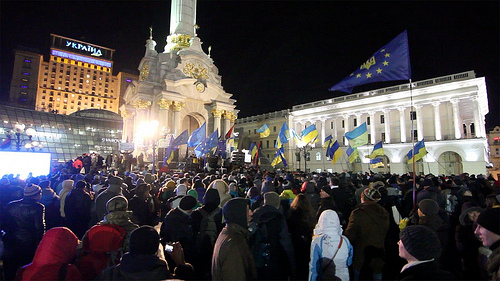
Protest in Kiev, November 2013
What’s it like growing up in Ukraine?
As a Ukrainian, I grew up speaking two languages: Russian and Ukrainian. I ate Ukrainian borsht for lunch and Russian pelmeni for dinner. I love Tchaikovsky’s Sleeping Beauty and Carols of the Bells by Leontovych. I am raising my own children trilingual in English, Russian and Ukrainian. In fact, the two cultures (Russian and Ukranian) are considered so close, that if an Ukrainian abroad says s/he is from Ukraine people often say “Oh, so you are from Russia?”
What’s going on between Russia and Ukraine?
With Russian troops moving across the sea into Ukraine’s Crimean peninsula, a lot of Westerners are starting to ask this question.
The current conflict in Ukraine is more than three months old. It began with a peaceful demonstration on November 21 at Independence Square (Maidan) in Kiev, the capital of Ukraine, when the (now ousted) Ukrainian president (Yanukovich) hesitated to sign an Association Agreement with the EU. This had been one of his major election promises and in breaking it he ignored the desire of millions of Ukrainians.
During the past three months, the “EuroMaidan” demonstration has grown into a much bigger movement. It started as a response to the failed EU deal but then truly turned into a movement against the corrupt government of president Yanukovich, who moved to keep Ukraine in long-lasting and very painful economical ties with Russia.
Then, after the government passed harsh, anti-assembly laws, it became about the basic human right to be able speak and think freely without being punished for it.
More than a hundred lives were lost and thousands injured during violent attempts to remove the demonstrators but people did not leave the cold streets of Kiev. More freedom fighters came from all over Ukraine to support them. Many other Ukrainian cities stood up as well. After three months of struggle, Mr. Yanukovich was impeached and left Ukraine (he refused to sign a resignation; he just ran away). His presidency was considered illegitimate and a new, temporary government was elected.
As Ukrainians were mourning over lives lost and looking into the future with great hope to build their country on principles of trust and freedom, a new enemy emerged: Informational War.
Along with Russia, Eastern Ukraine—where the majority is Russian speaking—is dominated by Russian-language news from the Russian media. Unfortunately, the Russian media coverage of events that have happened over the past three months is falsified [and full of propaganda].
Now, after the armed occupation of Ukrainian territory in Crimea by Russian troops, the reason for their untruthful reporting is understood: Creating social opinion in Russia and Russian-speaking Ukraine justifies military intervention into Ukrainian territories.
Personally, I think Mr. Putin has an imperialistic plan to be the most powerful ruler in modern history—politically and financially—and he will stop at nothing to add Ukraine to his control.
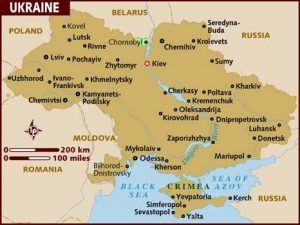
Russian Media Propaganda Uncovered
The following are all lies that have been spread by the Russian media leading up to the invasion of Ukraine by Russian troops:
1. FALSE: Kiev was Overrun by Violent Riots
Despite violent clashes, most of Kiev stayed peaceful throughout the demonstrations. The day-to-day lives of residents were largely unaffected outside of Independence Square and the areas immediately surrounding it. Very little of Kiev or the surrounding countryside was damaged or disturbed by the protests.
I know this because I called my family and friends every day. My nephews were going to school as usual, most of the people attended work on a daily basis, and all shopping malls and grocery stores were working (except for a few in the middle of the protest areas downtown).
2. FALSE: Anti-Russia Fascists Led the Ukrainian Protests
The vast majority of protesters were ordinary citizens tired of a government that they viewed as corrupt and unwilling to listen to the people. There were no fascist elements leading the demonstrations, and there are none leading the new government.
Many of the people I know personally were in Maidan: teachers, IT professionals, doctors, stay-at-home moms, businessmen, university professors, hair stylists and many others. People I worked with and went to school with. And no one will ever convince me that they are fascists. My daughter’s god-father is a surgeon and worked days and nights protecting the health and saving the lives of many.
3. FALSE: The New Government Will Force All Ukrainians to Speak Ukrainian
This is a particularly effective myth for Russian-language media, since it appeals directly to the people who would be most affected. Language has long been a contentious issue in Ukraine. Claims that Russian will be abolished are being used to generate anger against the new government.
The Ukrainian parliament voted to repeal a 2012 law allowing the establishment of minority languages as official state languages in individual provinces on February 23, 2014 but acting President Oleksandr Turchynov vetoed the move. Russian is currently recognized as an official language, is legal for state use in several Ukrainian provinces, and is guaranteed state protection “in all spheres of public life” in Crimea specifically.
I speak Russian and Ukrainian to my children here in the USA. I see language first and foremost as a tool for communication — and shame on any politicians who use it as a reason for war.
4. FALSE: Ukrainian Demonstrators Have Been Attacking Russians or Russian-Speakers
Another unproven and untrue claim widely circulated in Russian-language media is that the Euromaidan protesters were deliberately attacking Russian speakers.
The cruel result is that ordinary Russians – good, wholehearted, educated people – are now eager to help a Ukraine that they think is swamped by fascists! I have family in eastern Ukraine and my god-mother lives in Moscow. They have called multiple times, scared for the lives of my parents in Kiev. They really think Ukraine is in danger.
There is no evidence to support the claim, and nearly all cases of violence during the protest were perpetrated against civilians by security forces. The Euromaidan protests had very little to do with cultural or language issues in general.
While Yanukovych’s perceived obedience to the Russian government was certainly a source of anger in Ukraine, this anger was directed at the President and the actions of the Russian and Ukrainian governments, not to the Russian people or culture.
5. FALSE: The Berkut and Other Security Forces Fought in Self-Defense
Russian news broadcasts have shown extensive footage of the Berkut and other riot police under attack but nearly none of their attacks on civilians. The reality is that security forces attempted to crush peaceful protests with deadly force, and were barely driven back with improvised weapons like clubs and Molotov cocktails. The superior force and aggression were always on the side of the Berkut.
6. FALSE: The Independence Square/Euromaidan Protests Were Organized by Americans
We joke that EuroMaidan is now supported by Americans because my American husband and I made donations to help supply people with warm clothing and blankets during cold winter months.
I am not claiming that on a political level there is no lobbying of interests from outside countries and unions but once again: the politics of the country and the people of the country are two different things.
The vast majority of protesters were native Ukrainians and ordinary residents of Kiev and the surrounding country.
7. FALSE: Fascism Will Spread from Ukraine to Russia
This is another falsehood dependent on the idea that the Euromaidan demonstrators were fascist extremists. It is being used as a justification for Russian invasion. The Russian government claims it is defending Russian-speakers in Ukraine and its own borders from Ukrainian fascists but in reality those fascists do not exist.
What is next?
The military intervention is not over. It is hard to say what is going to happen next. There is a lot of talk going on at a very high, political level involving the EU and the US.
But Ukrainians have already had the biggest win in this struggle: themselves.
They proved to themselves that they care:
- They care about all of our people (amazing examples of collaboration happened during the civil unrest!);
- they care about the future of their country;
- they care about their freedom;
- they care enough to recognize the differences among themselves and to stay united anyway.
The revolution was heartbreaking and tearful but as a result, Ukrainians became true patriotic citizens of their country:
Glory to Ukraine, Glory to Heroes!
слава Україні, слава героїв
(slava Ukrayini, slava heroyiv)
For me, personally, it has been a life lesson in how to raise my own children. I have a clear goal to raise multicultural and multilingual children, who respect other languages and cultures and can see our shared humanity no matter how politicians try to divide us.
This is an original guest post to World Moms Blog by Olena Centeno.
 Olena Centeno is a Ukrainian who lives in USA, a happy mom of three wonderful kids ages 2-9 and a wife to the great. She speaks three languages herself and is raising her kids to be multilingual in English, Russian, Ukrainian and Spanish. She founded Bilingual Kids Rock, where she helps families on their bilingual journey. She also enjoys photography and video making as a way to preserve precious moments of life.
Olena Centeno is a Ukrainian who lives in USA, a happy mom of three wonderful kids ages 2-9 and a wife to the great. She speaks three languages herself and is raising her kids to be multilingual in English, Russian, Ukrainian and Spanish. She founded Bilingual Kids Rock, where she helps families on their bilingual journey. She also enjoys photography and video making as a way to preserve precious moments of life.
You can connect with her at Bilingual Kids Rock.
Photo credit to Oxlaey. This photo has a creative commons attribution license.
World Moms Blog is an award winning website which writes from over 30 countries on the topics of motherhood, culture, human rights and social good. Over 70 international contributors share their stories from around the globe, bonded by the common thread of motherhood and wanting a better world for their children.
World Moms Blog was listed by Forbes Woman as one of the "Best 100 Websites for Women 2012 & 2013" and also called a "must read" by the NY Times Motherlode in 2013. Our Senior Editor in India, Purnima Ramakrishnan, was awarded the BlogHer International Activist Award in 2013.
More Posts

by Sarah Sensamaust | Feb 26, 2014 | 2014, Africa, Cultural Differences, Expat Life, Family, Family Travel, World Motherhood
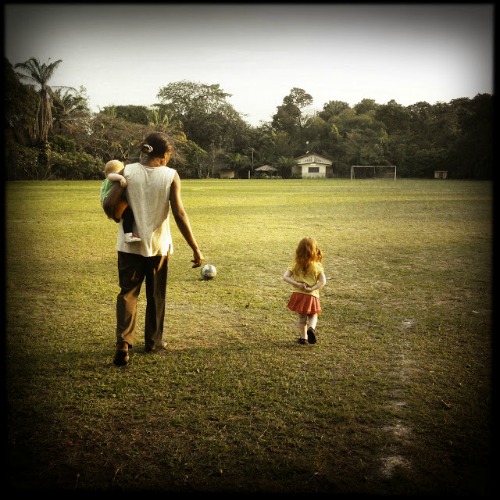 In about three months our lives will drastically change. My husband and I, with our two little girls, will leave the place we’ve called home for the last six years. We will probably never return.
In about three months our lives will drastically change. My husband and I, with our two little girls, will leave the place we’ve called home for the last six years. We will probably never return.
When we first came to Congo, we didn’t know much about the place, we didn’t know a soul here and we definitely didn’t have plans to start a family in this country. My, how everything’s changed.
Just as we had a “feeling” we should move to Congo. Now we have that same “feeling” that it’s time for us to leave. It just feels right and we have wonderful plans on the horizon, but boy is this hard. In fact, we’re feeling a bit lost in our last months here. This is the only home our children have ever known. Our girls have been loved by the nanny or “Mama” who’s helped us raise them for as long as they’ve been loved by us. This will be hard, but it is time.
And so I have lots of questions about how to do this, but more importantly how to do this right. Will there be something meaningful I forget to say or do? Do we make a big deal out of our last goodbyes? Or are our children really too young to understand? There will be tears. There might even be sobs. I hope we don’t needlessly upset them.
I can’t help but think about how much easier our departure would be if we didn’t have children. Their two little lives became a game changer for us living in Congo. Once we had children and the people around us began to care for them and love them, I could feel the roots sprout from my feet and bind us here. They helped us burp our girls when they were babies, nurse them back to health when they were sick, they’ve memorized their every tick and tock. This will be hard, but it is time.
Will our children have any authentic memories from these first years of their lives? Or will their only understanding of Congo come through the stories we tell them over and over? Will the photos they see when they’re older be the only images that remain in their heads? This will be hard, but it is time.
My husband and I always say the hardest part about living abroad is the leaving part. Goodbyes in your host country are usually forever. Sure, it’s hard leaving the United States and saying goodbye to parents and grandparents, but you know they’ll always be a part of your life. You’ll see them again. They’re your home base. They have the internet and email and Facebook and all those other lovely things that keep up connected to those we care about in the States.
When we leave Congo, there will be no email updates. We will not see pictures of the loved ones we leave here. We will miss births and weddings and all the minutiae in between that founded our friendships. This will be hard, but it is still the right time.
Has anyone left the country in which you’ve raised your children, never to return? Was there anything you did to make your last days meaningful or your departure easier?
This is an original post written for World Moms Blog by Sarah. You can find Sarah blogging with Jill Humphrey at Mama Congo.
Photo credit to Jill humphrey.

by Elizabeth Atalay | Feb 25, 2014 | 2014, Communication, Culture, Education, Older Children, Social Good
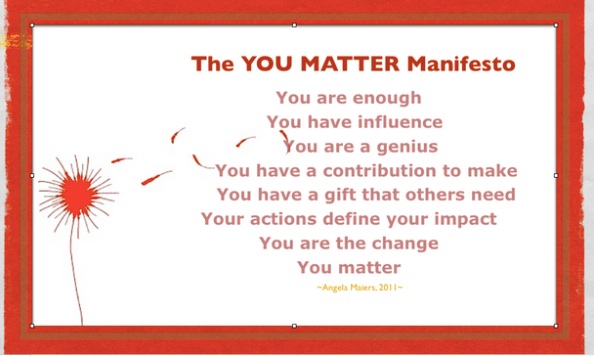
“You Matter”. The revelation that those two words can change the world seems so simple, so intuitive, yet those are not words that young people are used to hearing. Angela Maiers a long time educator, and founder of Choose2Matter decided that those two little words could be revolutionary. With her passion and enthusiasm behind the idea that we each have a unique genius to contribute, it is no wonder that her 2007 TEDx talk went viral. Thus the Choose2Matter movement was born.
“We were created for significance and one of the most dangerous things that can happen to us is the feeling that we don’t matter.”- Angela Maiers
Angela points out that she is not talking about an ego thing, studies show that feeling like you matter is a basic human need. The genius she sees in all of us is each individuals’ ability to problem solve from their own unique personal perspective. What started out as a digital community has now evolved into Choose2Matter Live events at schools across the U.S.A. In my mind perhaps no one needs to hear this more than high school kids who are in the process of self-discovery, so I was thrilled when the two-day Choose2Matter Live workshop came to my daughter’s public high school in Rhode Island.
The first thing the kids learned was the Choose2Matter Manifesto: You are enough, you have influence, you are a genius, you have a contribution to make, you have a gift that others need, your actions define our impact, you are the change, you matter. If they did not believe it before, they were now introduced to the idea that their voices and their actions can help others. The examples shown to this new group of kids of ways in which students have already made an impact through Choose2Matter are remarkable.
Honestly though, who doesn’t need to hear this manifesto? Even as adults the feeling that we matter is essential. This is an ideology that we frequently see first hand here at World Moms Blog, the power of one person, one idea brought to fruition, and how it can positively impact entire communities. Kristyn Zalota launched CleanBirth.org to provide safe birth for mothers in Laos, Alison Fraser started www.mom2momafrica to support the education of women and girls in Tanzania, and the founder of World Moms Blog Jennifer Burden created this global community of mothers from around the world when she couldn’t find what she was searching for online. These are just three examples of the many ways World moms Blog Contributors and Editors are using their passions and voices to make the world a better place. Their accomplishments inspire me to strive to do more in my own life, through their achievements I can see the possibilities when one puts their mind to solving a problem.
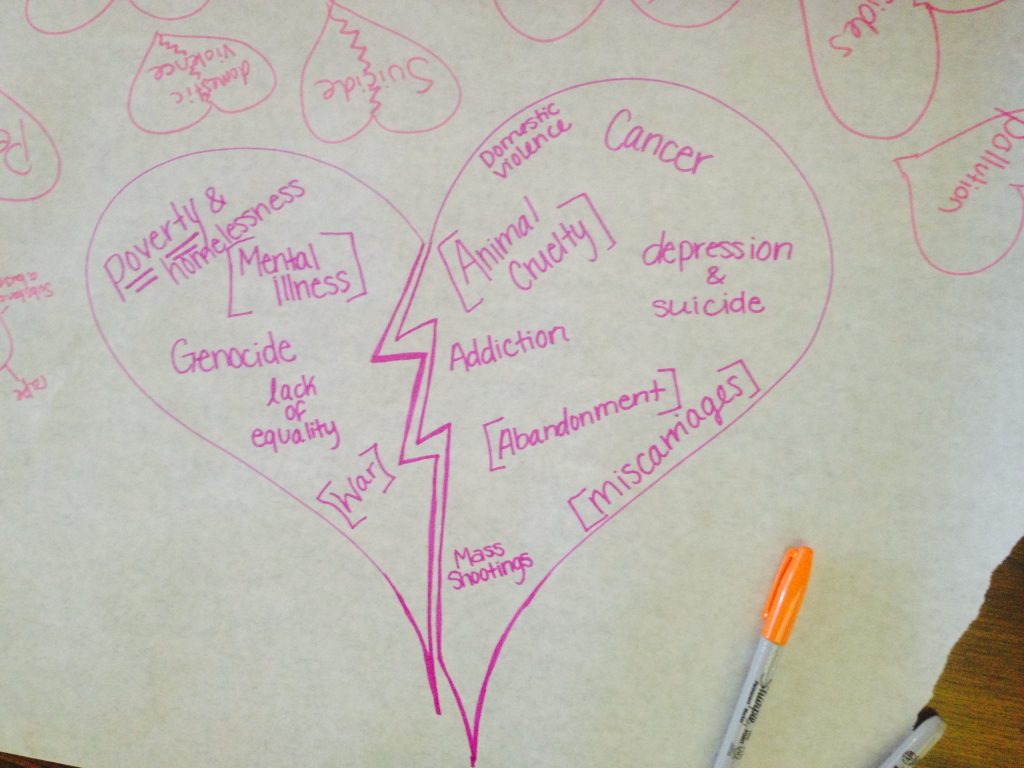
A Heart-Break Map
After the introduction, when the kids broke out into groups of “heart-break mapping” to narrow down what breaks their hearts about the world, and then come up with solutions of what they can do about it, my heart burst open. Kids narrowed down their heart breaks into solvable problems, some chose to be brave about sensitive issues they knew first hand to use their experience to try to help others. Due to a snow-day a room full of high school kids chose to voluntarily return to school on the saturday before vacation week to follow through on their ideas. It was truly amazing to watch these kids come together and talk through some of the major issues impacting society. I witnessed at least three new websites being born to begin to address some of their heart breaks , self-harm, depression, and body image issues for girls. These kids got it. As Angela and her colleague Mark told the kids, these ideas may not be the ones to solve a problem, but you are just building your muscles here, you are just getting started.
The lessons the kids at my daughter’s high school learned in those two days are sure to stay with them. The empowerment of knowing that they do matter, that they are capable of making a difference is huge. The students were left with the message that they are the ones who will need to come up with the answers to the world’s most pressing problems, because us adults just may not have all the answers. (But that is one thing I think all teenagers already seem know.)
This is an original post written for World Moms Blog by Elizabeth Atalay of Documama.
Do you have any great examples of the power of one person who made an impact to share?

Elizabeth Atalay is a Digital Media Producer, Managing Editor at World Moms Network, and a Social Media Manager. She was a 2015 United Nations Foundation Social Good Fellow, and traveled to Ethiopia as an International Reporting Project New Media Fellow to report on newborn health in 2014. On her personal blog, Documama.org, she uses digital media as a new medium for her background as a documentarian. After having worked on Feature Films and Television series for FOX, NBC, MGM, Columbia Pictures, Warner Brothers, 20th Century Fox, and Castle Rock Pictures, she studied documentary filmmaking and anthropology earning a Masters degree in Media Studies from The New School in New York. Since becoming a Digital Media Producer she has worked on social media campaigns for non-profits such as Save The Children, WaterAid, ONE.org, UNICEF, United Nations Foundation, Edesia, World Pulse, American Heart Association, and The Gates Foundation. Her writing has also been featured on ONE.org, Johnson & Johnson’s BabyCenter.com, EnoughProject.org, GaviAlliance.org, and Worldmomsnetwork.com. Elizabeth has traveled to 70 countries around the world, most recently to Haiti with Artisan Business Network to visit artisans in partnership with Macy’s Heart of Haiti line, which provides sustainable income to Haitian artisans. Elizabeth lives in New England with her husband and four children.
More Posts

 “Hey bro, vipi? How much for these shoes?” I ask the second-hand market vendor.
“Hey bro, vipi? How much for these shoes?” I ask the second-hand market vendor.
















